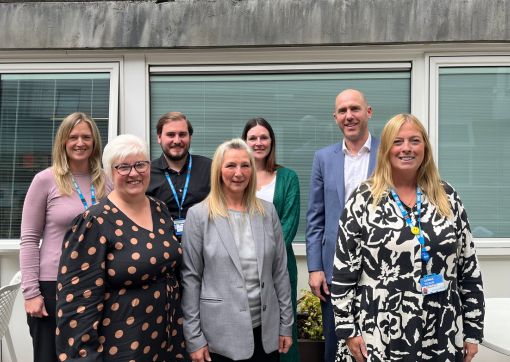Director of Operations, Tom Strickland, recently had a blog post featured in the West Yorkshire Health and Care Partnership newsletter where he shared the journey of creating our new Trust-wide initiative - Outpatient User Groups (OPUGs). You can read his full article below:
Over the last few years here at CHFT, I have been in a privileged position to lead a fantastic team of colleagues who have driven significant and sustained improvements to our planned care waiting lists. This is of course continuing, and we’re building on this work all the time. But in true #TeamCHFT fashion, we’re not standing still.
Our view is that our services sit together. Improvements in one area can help across specialities, and we can learn from one another. This year, we have started taking the best bits of learning from our planned care work into looking at how we transform our outpatient specialty services across our Trust. Our outpatient services typically see around 2,000 patients per day, but we know there is more we can do to see more of the right patients, in the right place within our capacity and existing resources.
It’s a priority for us because outpatient services are often the first step in the patient journey with us. It sets the tone for how a person will experience care at our Trust, and delays at this stage can have a ripple effect on the whole care pathway.
A key part of our achievements in reducing planned care waiting lists was our collaboration and teamwork, without finger pointing, which led to collective action. Much of this stemmed from our highly successful Surgery and Theatre Improvement User Groups, or STUGs, as they became known. We have taken our learning from STUGs to create our Outpatient User Groups, which of course we have named OPUGs, which are at the heart of our outpatient transformation programme.
Each outpatient speciality has its own OPUG, which is an open invite for any colleague, at any level, with just one expectation – that everyone participates collaboratively and constructively. OPUGs are driven by what that particular speciality needs and their own potential for improvement. They are supported by leadership colleagues to help with commitment to action and the practical implementation of improvements, as well as helping to avoid stalled efforts and ensuring continuous progress.
Our decisions are driven by data and best practice. We will continue to pinpoint improvement opportunities, and what is and isn’t working, based on accurate and focused metrics, including slot utilisation, DNA rates and Patient-Initiated Follow Up (PIFU), along with specific hotspot metrics for more tailored insight. Our core OPUG themes will support our data driven approach by looking at clinic utilisation and productivity, as well as booking processes, alongside vital metrics such as health inequalities and deprivation data, so we make sure we minimise variation in care.
We know that outpatient specialities do not sit in isolation with other services. Our OPUGs will also review our clinical pathways to make sure they are patient focused with the end-to-end pathway in mind. They will link with other Trust programmes, including work on our patient portal and Community Diagnostic Centres to maximise opportunities for improvement. We recognise that primary and community care engagement will also play a vital role.
I have seen how this approach has worked in our surgical division to not just reduce waiting times and enhance patient safety and experience but also enhance the working lives of colleagues. Though our outpatient improvement programme is at an early stage, from a leadership perspective it is exciting to see it already developing and creating a buzz amongst colleagues and I hope to be able to share further insight into how the programme is working in the coming months.

